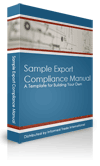ITAR Export Exemptions
Authorizations to transfer defense articles and provide defense services can help meet the legitimate needs of friendly countries. However, the U.S. strictly regulates exports and re-exports of defense items and technologies to protect its national interests and peace and security of the broader international community. There are 60 exemptions established in the International Traffic and Arms Regulations (ITAR) (CFR 120-130) that permit the permanent or temporary export or temporary import of defense articles and technical data by U.S. persons in lieu of obtaining a U.S. license from the U.S. Department of State Directorate of Defense Trade Controls. An exemption is an authorization that covers various situations with specific requirements.
What does an exemption cover?
The exemption would permit permanent and temporary exports and temporary imports of technical data and defense articles without use of a license. The exemption would permit the performance of defense services associated with the defense articles subject to the exemption. Those defense articles on the U.S. Munitions List (USML) eligible for the exemption would be similar to those eligible to the Canadian exemption. The Canadian exemption significantly relaxes DDTC requirements for exports to Canada of ITAR-controlled “defense articles”, “defense services”, and technical data. Canadian companies that register with the Canadian Controlled Goods Directorate are generally eligible to use the ITAR Canadian exemption. This greatly facilitates business between the United States and Canada. The exemption would also permit temporary import to the United States of defense articles with advance approval to re export back to the country.
Body Armor Amendment §123.17 found in the publication of the Federal Register Notices Page 39212, Vol. 74, No. 150 is an example of an exemption.
Can any country take advantage of an exemption?
The United States expects that agreements can be reached with the United Kingdom and Australia first, because their systems are closest to meeting the standards of the U.S. for congruent and reciprocal systems of export control, industrial security law enforcement and intelligence and reciprocal access to defense markets, and early success here is most probable. But the exemption would be available to any ally that is willing to “level up.” Globalization can set high standards for countries to meet in security. The U. S. is willing to share more technologies with countries that put in place and actually implement such higher standards on export controls and other areas.
Are there benefits to an exemption?
An exemption can create a powerful incentive for other allied governments to improve their export control system. Many allied governments will be strongly motivated to improve their systems if this allows improved access to U.S. markets.
What defense articles or technical data are excluded?
ITAR exemptions are targeted to specific unclassified items and services. Generally, it is not contemplated that exemptions would apply to exports of items controlled under the Military Technology Control Regime, Significant Military Equipment, transactions requiring Congressional Notification, or offshore procurement of sensitive or classified items or technologies. Dealing with ineligible persons or proscribed destinations is also excluded.
Defense Trade Securities Initiatives
The Defense Trade Security Initiatives (DTSI) is comprised of 17 reforms that are designed to streamline the processing of munitions export licenses. These initiatives include, amongst other things, granting International Traffic in Arms Regulations (ITAR) exemptions for unclassified exports to certain foreign governments and companies, and a range of flexible, new licensing vehicles for NATO member countries, Japan, and Australia.
Section III of the DTSI deals with enhancing existing International Traffic in Arms Regulations (ITAR) exemptions as shown below:
-
Extension of ITAR Exemption to Qualified Countries
-
This initiative applies to allied countries that adopt and demonstrate export controls
and technology stems that are comparable to those in the U.S.
-
This initiative applies to allied countries that adopt and demonstrate export controls
-
Exemption for Export Licensing of Maintenance Services and Training
- This initiative expands the ITAR exemption to authorize U.S. companies, without licensing requirements, to provide basic maintenance and/or maintenance training for inventories allied equipment.
-
Exemption for Export of Technical Data in Response to Department of Defense Requests for Proposals
- This initiative expands the ITAR exemption to allow U.S. firms, without licensing requirements, to provide basic maintenance and/or maintenance training for inventory allied equipment.
-
Improving Department of Defense’s Use of ITAR Exemptions
- This initiative authorizes Department of Defense to use the numerous exemptions to licensing requirements that the Department of Defense can utilize in connection with exports of defense articles, technical data, and defense services.
Is my article exempt or not?
Take your time to review the attached DDTC Exemption Number link. This table will provide the exporter the specific ITAR citation exemption number needed for the export shipment from the requirement for a license or other written authorization. If in need of further assistance in determining the correct code, contact the DDTC in writing or request advice from individual licensing officers familiar with the commodities being exported.
Penalties for Violations
Per ITAR CFR 22 Section 127.3, Penalties and Violations, any person who willfully violates any provision of section 38 or section 39 of the AECA, or any undertaking specifically required by par 124 of the ITAR or in a registration, license application, or report required by section 38 or section 39 of the AECA or by any rule or regulation issued under either section, makes any untrue statement of a material fact or omits a material fact required to be stated or necessary to make the statements not misleading, shall upon conviction be subject to fine or imprisonment, or both.
In summary, if used correctly, ITAR licensing exemptions can be an important tool in facilitating exports of defense articles, technology, or services. Given strict DDTC licensing requirements, however, it is critical that you are properly interpreting and applying these highly complex exemptions or risk harsh enforcement and penalties.
Posted on July 11th, 2011 by admin
Filed under: ITAR

